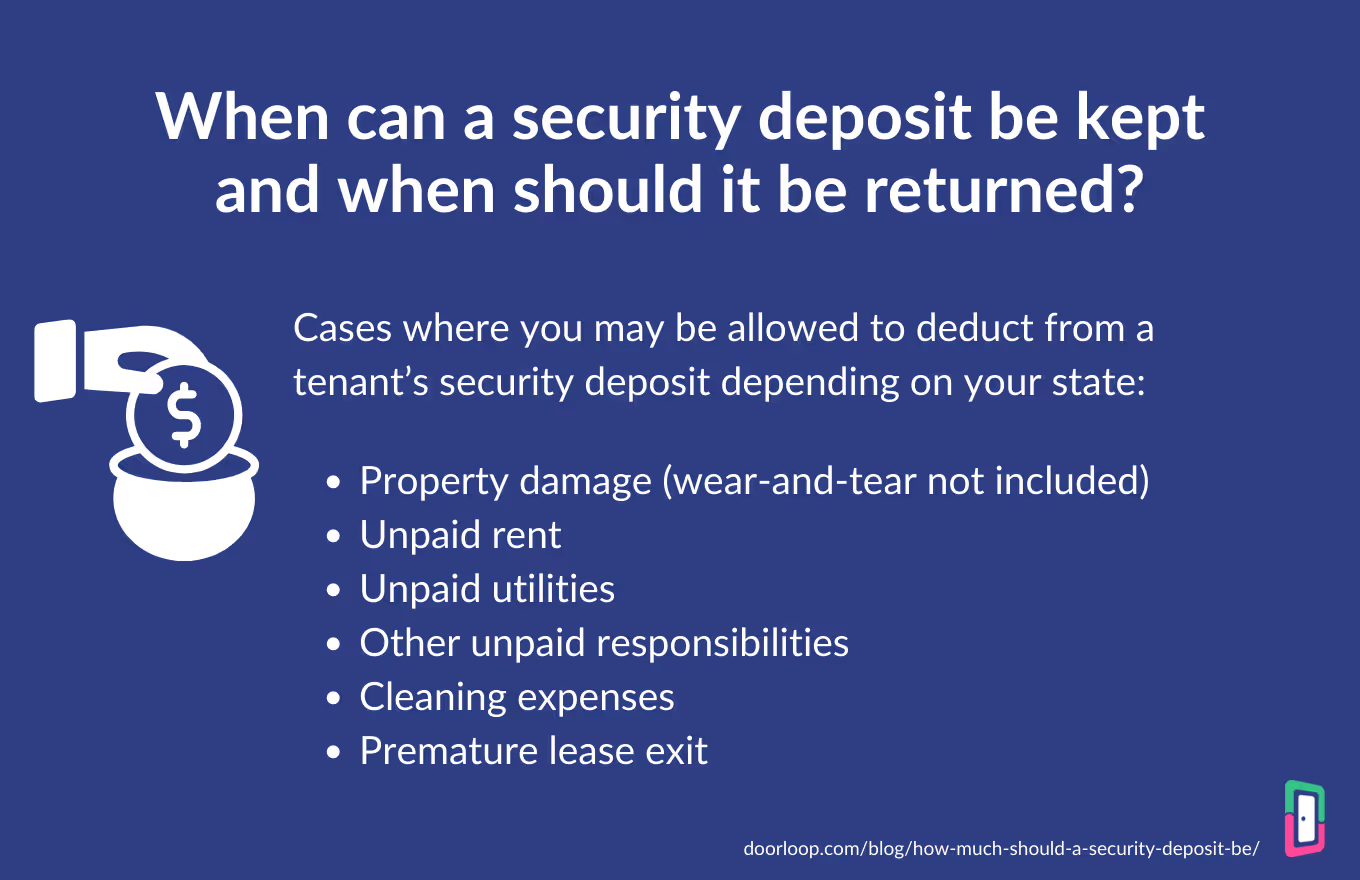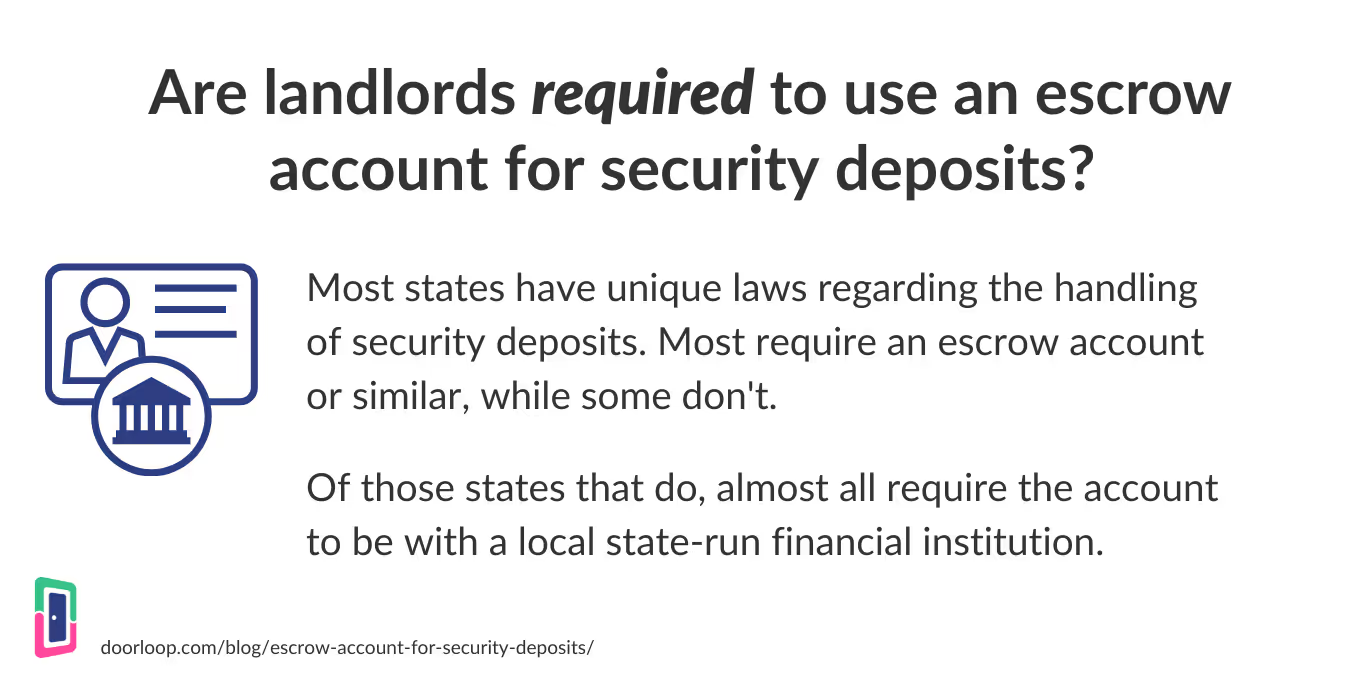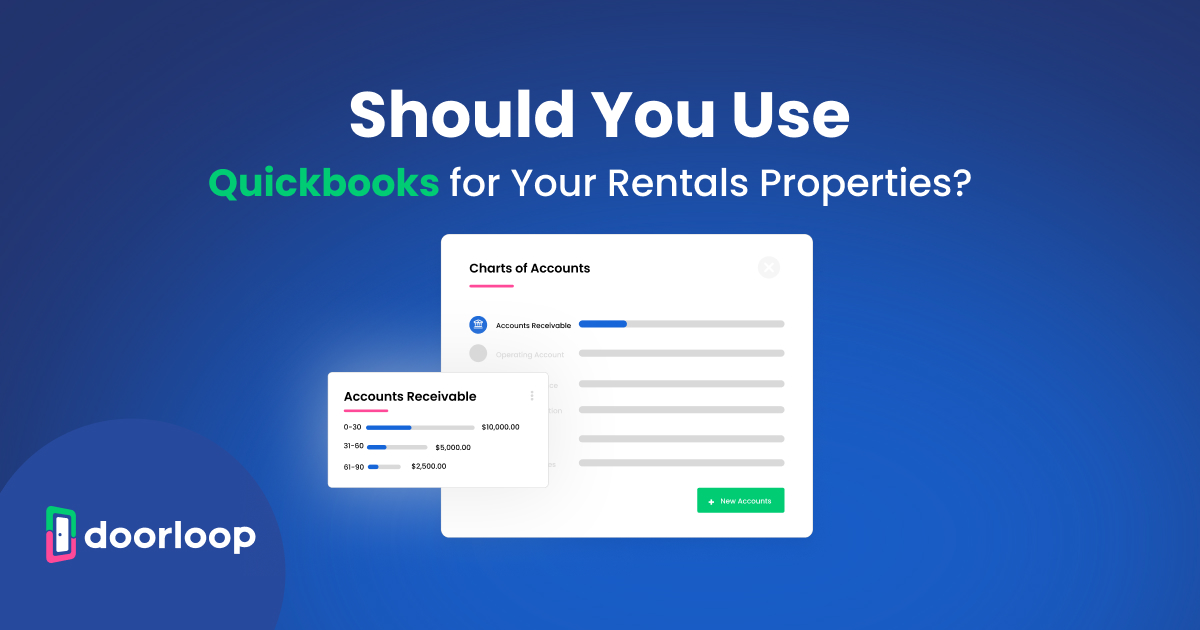Security deposits are one of those things that are easy to overlook, but managing them properly is vitally important.
Mismanage your security deposits and you could end up:
- Not having the funds to pay for damages, or
- Eating a lawsuit
… all depending on how you mismanaged the funds.
But no reason to fear. Once you know how much your security deposits should be– and the right rules and regulations for your state- you’ll be set.
Read on to find out how much your security deposits should be.
Then, once you’re done, head over to our guide on security deposit escrow account rules for all 50 states.
Security deposit amount
How much your security deposits should be for your rentals depends on two factors:
- The maximum amount allowed by your state, and
- Market factors such as comparable properties/units
You want to get as high a deposit as possible but you also don’t want to set your security deposit so high (within state law) that it repels would-be renters from ever applying.
Always start by consulting your local laws, as those are the most hard-line rules for what to set your security deposits as.
For example, according to courts.ca.gov, in California you’re allowed to set security deposits at a maximum of 2 month’s the rental rate for the average unfurnished rental:

So, if you’re charging $1,4000 for a unit, your maximum security deposit can be $2,800.
However, you might not want to charge $2,800 for your security deposit if most rental properties in your area don’t charge more than $2,250 on average.
Setting a higher security deposit will mean you’ll need to justify it with something such as partial or full furnishing or special amenities that your competitors don’t have.
Some states allow you to charge significantly higher security deposits specifically if your unit is furnished, so that’s something else to look into if that applies to you.
When to keep the security deposit
Let’s jump now to the end of your tenant’s lease.
How do you know if and how much to keep and if and how much should be returned?
You’ll need to make sure that your lease agreement clearly stipulates what would result in the tenant losing part or all of their security deposit.
Most states already have laws in place stating when security deposits can be withheld, so check your local laws first before deciding on any additional policies that will fit within that (but still align with local laws for both you and your tenants).

These are a few example cases where you may be allowed to deduct from a tenant’s security deposit depending on your state:
- Property damage (wear-and-tear not included)
- Unpaid rent
- Unpaid utilities
- Other unpaid responsibilities
- Cleaning expenses
- Ending a lease prematurely
In every case, so long as a tenant has abided by all lease rules and local laws, namely that they have:
- Not damaged the property, and
- Fulfilled all their financial responsibilities
Their full security deposit should be returned.
It’s also important to note that most states have policies for how soon security deposits need to be returned.
Going back to our California example, that’s 21 days, while in Texas that’s typically 30.
Security deposit disputes
Occasionally, a dispute may arise related to a tenant’s security deposit.
To keep this from happening, and ensure that you’re covered from any potential legal trouble, it’s important to keep a security deposit receipt with an itemized list of expenses.
This list should clearly detail everything and anything you needed to pay for to repair the unit and recoup costs related to unfulfilled responsibilities.
Beyond this, make sure to keep records of everything. That could be a picture of the damage or records of the tenant’s financial responsibilities and subsequent payments (or lack-there-of).
Preventative steps are also helpful here, such as running through the unit with the tenant present using a checklist and having the tenant sign off on the checklist when moving in and before moving out.
In addition to this, make sure you’re clear on what your maintenance responsibilities are as outlined in your local laws so you know what you’re responsible for and what you’re allowed to use your tenant’s security deposit to pay for.
Opening an escrow account
In nearly all states, you’re required to keep security deposits in an escrow account.
This can simply be a checking account you use strictly for a tenant’s security deposit and nothing else (one account for each tenant/security deposit), or it can be a more tailored solution.
Setting up an escrow account for a security deposit is pretty straightforward.
Here’s how to do it:
1. Choose the account
This can technically be any checking account, though there are accounts specifically designed to be used as escrow accounts for security funds.
One good example is J.P.Morgan Chase’s Tenant Lease Security Deposit account:

2. Set up the account
No matter what type of account you use, make sure you open a different account for each tenant and security deposit. ww
Also, keep in mind that in some states the type of account you need to place the funds into is specified.
So check with your local laws before setting up the account.
3. Transfer the tenant’s security deposit funds
Transfer the funds to the new account and make sure the total lines up with the amount in the tenant’s lease agreement.
4. Notify the tenant of where the funds are located
In most states, you’re required by law to notify the tenant where their security deposit funds are located.
It’s important to remember that security deposit funds are still technically the tenant’s funds, not yours, so in most states you’re legally required to notify your tenant of where you’re keeping the fund.

Requirements by state
Not every state requires an escrow account be used for security deposits.
Some simply require the account bears interest and that the interest the account generates is passed to the tenant.
To find out more about what your state requires regarding security deposit law and escrow accounts specifically, check out our guide which details the rules regarding the handling of security deposits for every one of the 50 states:
Escrow Account for Security Deposits: Rules for All 50 States.
And learn more about your state’s rental laws here: Real Estate Rental Laws in the US | DoorLoop.
































.svg)
.svg)

